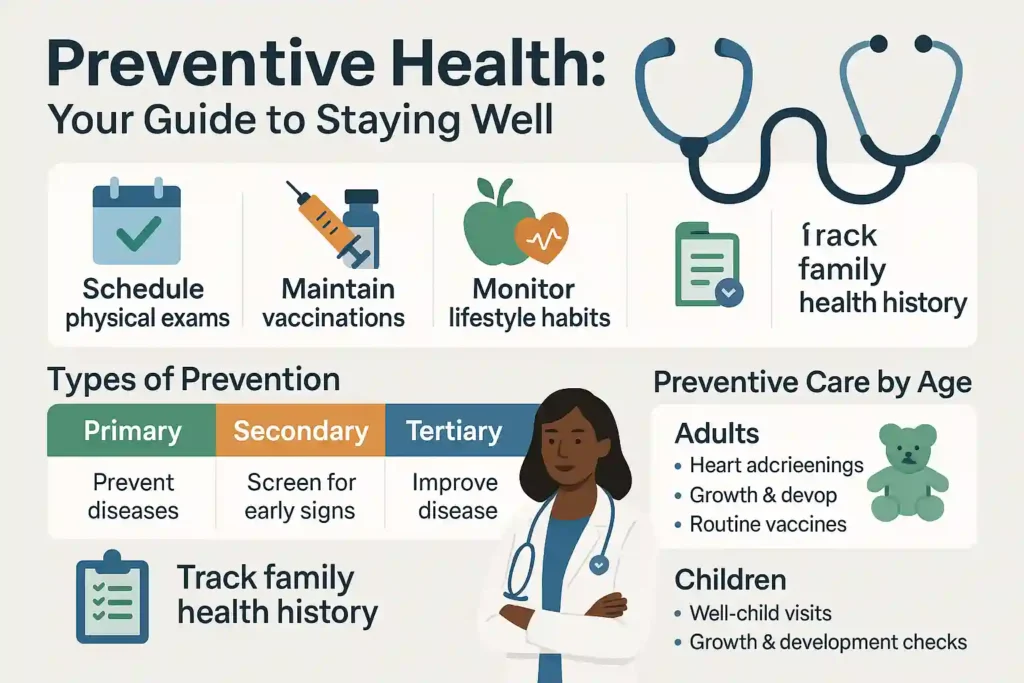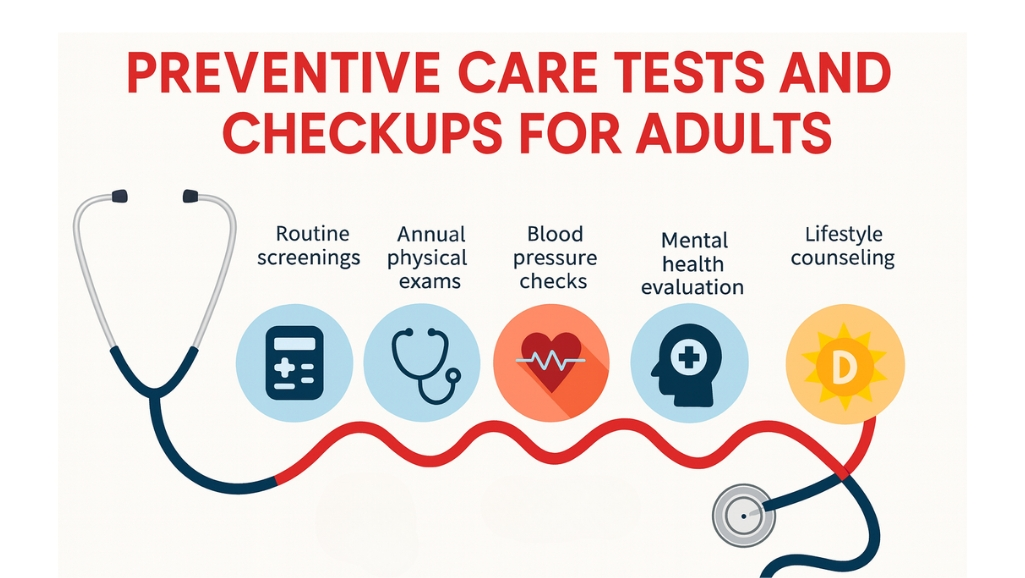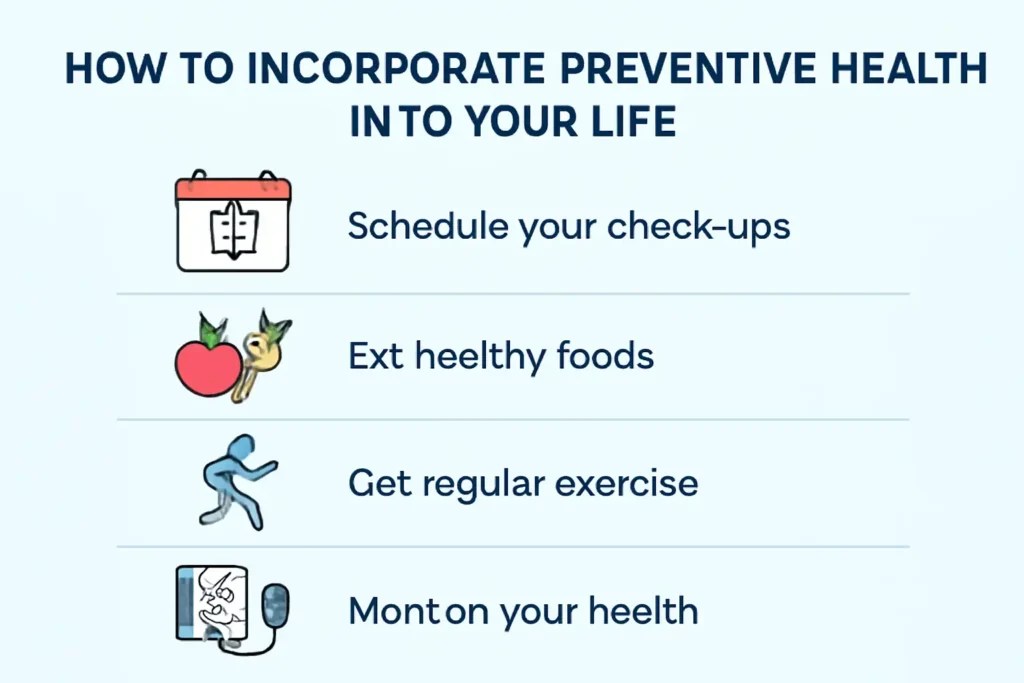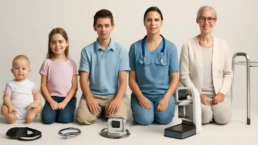Preventive health is the foundation of staying well, not just treating illness, but stopping it before it starts. It’s the smart way to avoid disease, live longer, and spend less on medical care.
Table of Contents
ToggleIf you’ve ever wondered what is preventive care, or why you should care about checkups when you feel fine, you’re about to find out.
Let’s break it down.
What Exactly is Preventive Health?

Preventive health is a method of care that focuses on stopping diseases before they develop. This is done through regular tests, healthy lifestyle choices, and early medical guidance.
The meaning of preventive health care includes everything from vaccinations to advice on nutrition and exercise. It’s a proactive way of living that saves lives and lowers healthcare costs.
By investing in preventive health care, you can avoid many chronic diseases, reduce emergency visits, and protect their future. It’s not just about avoiding illness, it’s about supporting better, longer life through prevention in health care.
Types of Preventive Health Measures
Preventive care happens in three main stages. Each stage plays a different role in keeping you healthy.
Primary Prevention
The goal of primary prevention is to stop illnesses before they begin. It includes:
- Vaccinations (like flu, COVID-19, polio)
- Lifestyle choices (no smoking, balanced eating)
- Health education programs
These actions protect people from infections, chronic diseases, and even cancers before they begin.
Secondary Prevention
Secondary prevention detects illnesses before they worsen. Examples include:
- Mammograms
- Blood sugar and blood pressure checks
- Colonoscopies
This type of care helps doctors treat conditions in their early, more manageable stages, preventing serious complications.
Tertiary Prevention
Tertiary prevention involves the management of current diseases to minimize further complications.
This includes:
- Stroke rehab
- Diabetes management
- Heart disease monitoring
It helps limit long-term effects and supports recovery, improving quality of life for patients with chronic conditions.
What Types of Tests, Screenings, and Services Are Part of Preventive Care for Adults?

Preventive care for adults covers many simple tests and checkups. Some of the most important are:
- Routine screenings: Breast, prostate, and colorectal cancer checks.
- Annual physical exams: Full-body checkups that assess heart, lungs, and overall health.
- Blood pressure checks: Monitors heart disease risk.
- Cholesterol monitoring: Detects heart and artery problems.
- Vaccination schedule: Keeps adults safe from flu, shingles, tetanus, and more.
- Mental health evaluations: For early signs of depression, anxiety, or stress disorders.
- Lifestyle counseling: Covers smoking cessation, diet, and fitness for health promotion.
Some of these are quick, painless, and often fully covered by insurance. These tools help with disease prevention before it becomes expensive or dangerous.
What’s Considered Preventive Care for Children?
Preventive care for kids focuses on long-term population health by starting early. According to both competitor sources, the following are essential:
- Well-child visits: Measure growth, monitor development, and build trust between doctors and parents.
- Vaccination schedule: DTaP, MMR, hepatitis, polio, and flu shots are critical for disease prevention.
- Screenings: Autism, ADHD, hearing, vision, and lead levels.
- Mental and behavioral health checks: Spot early signs of stress, anxiety, or developmental issues.
This kind of wellness care ensures children grow into healthy adults with fewer long-term risks.
Why Is It Important to Know Your Family Health History?
Family history gives clues about your personal health risks. You are at a higher risk of developing diabetes, heart disease, or cancer if your parents or siblings already have these conditions. That’s why doctors use this info to recommend earlier or more frequent tests.
Understanding your background helps you take steps early whether through lifestyle changes or routine screenings, so you stay ahead of any hidden risks. It’s among the most effective ways to intervene in public health.
What’s the Difference Between a Preventive Test and a Diagnostic Test?
| Aspect | Preventive Test | Diagnostic Test |
| Purpose | Detect risk before symptoms appear | Confirm disease after symptoms start |
| Example | Mammogram for healthy adults | Mammogram for a breast lump |
| When It’s Done | On a regular schedule | When symptoms or risks are present |
| Goal | Early detection, risk reduction | Diagnosis, treatment planning |
Barriers to Preventive Health
If preventive care is so helpful, why don’t more people use it?
Here are some common roadblocks:
- Cost worries: Many people think it’s expensive, even though most services are free under insurance.
- Time limits: Some avoid doctors because they’re too busy.
- Fear or denial: People often skip tests because they’re scared of what they might find.
- Access issues: Rural people live far from clinics or can’t find a doctor who offers these services.
- Stigma: Mental health checkups still carry shame in many communities.
All of this shows that healthcare accessibility is just as important as medical knowledge.
How to Incorporate Preventive Health Into Your Life?

You don’t have to change everything overnight. Start small:
- Schedule your annual physical exam.
- Ask your doctor about routine screenings for your age.
- Stay up to date on your vaccination schedule.
- Cut down on sugar, processed foods, and smoking.
- Take short walks daily.
- If necessary, monitor your cholesterol or blood pressure at home.
The secret is consistency. Small steps can improve quality of life and increase life expectancy without fancy tools or big costs.
Also, teaching your kids healthy habits early makes a big difference in their future.
The Bottom Line
Preventive health is about doing enough, early enough, to live better and longer.
You don’t need to wait for a scary diagnosis to take action. Start now. Book that checkup. Get your screenings. Talk to your doctor about your risks.
Think of it this way: the more you do today, the less you’ll need to worry tomorrow.
With simple, steady steps, preventive health care turns into something powerful, it puts your well-being back in your hands.
FAQs About Preventive Health
What is the meaning of preventive health?
It refers to actions taken to stop illness before it starts, like checkups, screenings, and healthy living habits.
What is preventive health care?
This includes routine doctor visits, immunizations, and screenings meant to keep you healthy and detect risks early.
Why is preventive health care important?
It lowers disease risk, saves healthcare costs, improves life quality, and increases the chance of early treatment.
What are the examples of preventive health?
Examples include flu shots, colon cancer screenings, blood tests, mental health checks, and smoking cessation counseling.
How often should I get preventive health check-ups?
Adults should get annual checkups, but some screenings depend on age, gender, and family health history.
Can preventive health reverse existing conditions?
No, but it helps manage conditions better, slows their progression, and avoids further complications or emergency care.

This article is medically reviewed by Dr. Chandril Chugh, Board-Certified Neurologist, providing expert insights and reliable health information.
Dr. Chandril Chugh is a U.S.-trained neurologist with over a decade of experience. Known for his compassionate care, he specializes in treating neurological conditions such as migraines, epilepsy, and Parkinson’s disease. Dr. Chugh is highly regarded for his patient-centered approach and dedication to providing personalized care.








